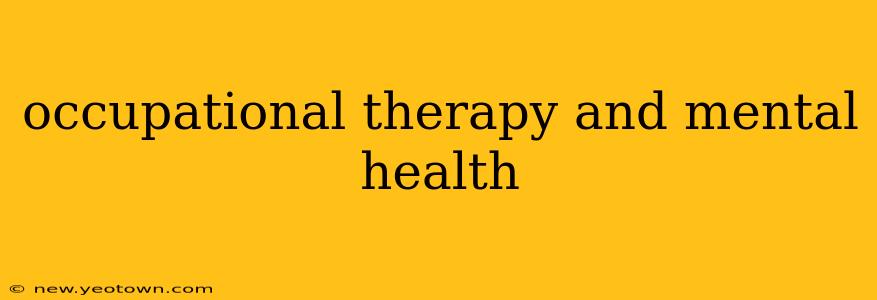The bustling city hummed around me, a symphony of sirens and hurried footsteps. Inside, however, it was quiet. A young woman, Sarah, sat hunched over, her hands clasped tightly in her lap. She hadn't left her apartment in weeks, consumed by anxiety and depression. This wasn't just a case for a psychiatrist; this was where occupational therapy stepped in, quietly but powerfully. This is the story of how occupational therapy and mental health intertwine to create a path towards recovery and well-being.
What is the role of occupational therapy in mental health?
Occupational therapy (OT) focuses on enabling people to participate in the activities of daily living (ADLs) that are meaningful to them. In the context of mental health, this means helping individuals overcome the barriers that prevent them from engaging in these activities. These barriers can be physical, emotional, cognitive, or social. For Sarah, it was a crippling mix of anxiety and depression manifesting as social isolation and an inability to manage basic self-care.
My role as an occupational therapist wasn't to "cure" her depression, but to empower her to reclaim her life. We started small, focusing on concrete, achievable goals. This wasn't a passive process; it was a collaborative journey built on trust and mutual respect.
How does occupational therapy help with anxiety and depression?
Sarah's anxiety manifested as avoidance. She avoided social situations, avoided chores, and even avoided basic self-care. OT helped her break down these overwhelming tasks into smaller, manageable steps. We created a daily schedule, starting with simple things like making her bed and showering. Each accomplishment, no matter how small, boosted her confidence and self-efficacy. This is the power of graded exposure, a cornerstone of OT in mental health.
We also explored activities that brought her joy—things she once enjoyed but had stopped doing due to her depression. This could be anything from listening to music to reading a book, from engaging in a hobby to reconnecting with a friend. Reintroducing these activities slowly helped her regain a sense of purpose and identity beyond her mental health challenges.
Furthermore, we addressed her cognitive impairments, common with depression. We implemented strategies to improve concentration and memory, essential for daily functioning and regaining independence.
What are the benefits of occupational therapy for mental health conditions?
The benefits of occupational therapy for mental health are multifaceted. For Sarah, it meant:
- Improved self-esteem: Achieving small goals built her confidence and sense of self-worth.
- Increased independence: She gradually regained the ability to manage her daily life independently.
- Reduced anxiety and depression symptoms: By addressing the practical barriers to engagement, her symptoms lessened.
- Enhanced social participation: Slowly, she began reconnecting with friends and family.
- Improved quality of life: She regained a sense of purpose and enjoyment in life.
Can occupational therapy help with schizophrenia?
Yes, occupational therapy plays a significant role in supporting individuals with schizophrenia. It addresses the cognitive, social, and practical challenges associated with the condition. OT focuses on developing strategies for daily living skills, improving social interaction, and managing symptoms like hallucinations or delusions. It often involves working closely with the psychiatric team to provide a holistic approach to care.
How do I find an occupational therapist for mental health?
Finding an occupational therapist specializing in mental health usually begins with a referral from your doctor or psychiatrist. You can also search online directories for occupational therapists in your area who specialize in mental health. It is important to find a therapist you feel comfortable with and whose approach aligns with your needs and goals.
What types of mental health conditions can occupational therapy help with?
Occupational therapy is effective in addressing a wide range of mental health conditions, including but not limited to: anxiety disorders, depression, schizophrenia, bipolar disorder, PTSD, and personality disorders. The specific techniques and interventions used will vary depending on the individual’s unique needs and diagnosis.
Sarah's journey wasn't a quick fix; it was a process of gradual healing and empowerment. But thanks to the collaborative efforts of her psychiatrist and occupational therapist, she eventually found her way back to a life filled with purpose, joy, and connection. This is the remarkable power of occupational therapy in mental health: it helps individuals not just survive, but truly thrive.

